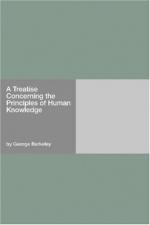37. The philosophic, not the vulgar substance, taken away.—I will be urged that thus much at least is true, to wit, that we take away all corporeal substances. To this my answer is, that if the word substance be taken in the vulgar sense—for a combination of sensible qualities, such as extension, solidity, weight, and the like—this we cannot be accused of taking away: but if it be taken in a philosophic sense—for the support of accidents or qualities without the mind—then indeed I acknowledge that we take it away, if one may be said to take away that which never had any existence, not even in the imagination.
38. But, say you, it sounds very harsh to say we eat and drink ideas, and are clothed with ideas. I acknowledge it does so—the word idea not being used in common discourse to signify the several combinations of sensible qualities which are called things; and it is certain that any expression which varies from the familiar use of language will seem harsh and ridiculous. But this doth not concern the truth of the proposition, which in other words is no more than to say, we are fed and clothed with those things which we perceive immediately by our senses. The hardness or softness, the colour, taste, warmth, figure, or suchlike qualities, which combined together constitute the several sorts of victuals and apparel, have been shown to exist only in the mind that perceives them; and this is all that is meant by calling them ideas; which word if it was as ordinarily used as thing, would sound no harsher nor more ridiculous than it. I am not for disputing about the propriety, but the truth of the expression. If therefore you agree with me that we eat and drink and are clad with the immediate objects of sense, which cannot exist unperceived or without the mind, I shall readily grant it is more proper or conformable to custom that they should be called things rather than ideas.




